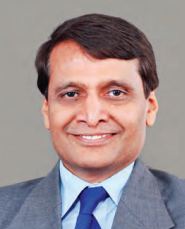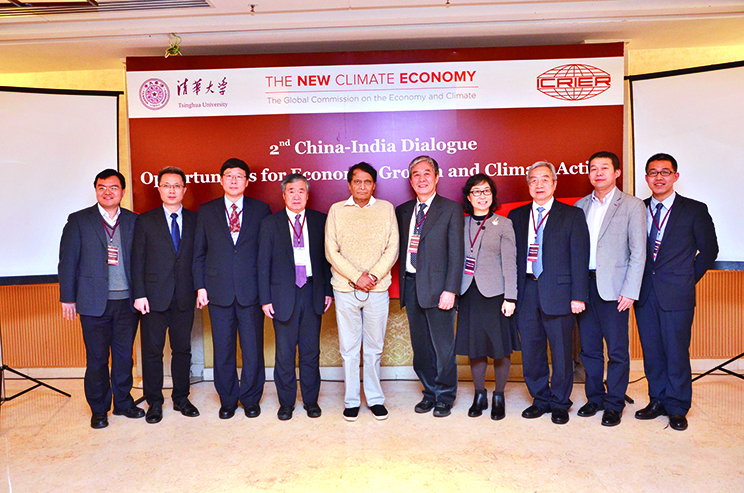Suresh Prabhu
Biz@India
May 2018
From integrating India with the global economy, to developing trade relationships with countries, the Ministry of Commerce & Industry is making sure that every aspect of the sector is managed to its full capacity. Suresh Prabhu talks to Biz@India about the Indian economy, bilateral trades and more.
As you head to the OECD ministerial meet, the WTO negotiations are still blocked. Isn’t India getting short-changed by its trading partners? For instance, the Doha Development Round has never seen the light of the day and now India’s key partners like the US and the EU expect India to drop its tariffs and open its markets the same way as a rich economy would do. Is India ready to accept such a deal? What are the main issues on the table for the OECD meeting?
India is always embracing global community. We have relationships with all countries in the world, so we always try to integrate ourselves with the global economy. We believe that the future of the world lies in everybody working together towards a common destiny. So we have to work very closely with each other.
Organisation for Economic Cooperation and Development (OECD) is a very important organisation. The member countries’ economies are very large and over a period of time, OECD has also become a think-tank. It works with countries, its people and try to come out with various publications. I have interacted with OECD quite a bit and I shall go to OECD in Paris and would be very happy to work with them.
OECD is a very important organisation and we don’t see any challenge in dealing with OECD as an organisation or its members.
What is your view on 2018? Where is the global economy headed?
Economy of the world can grow only when we work with each other. The global economic growth depends upon economic interdependence. If we don’t integrate, we will never grow. In the last almost 35 years, since World Trade Organization (WTO) has become a very important entity, the world has seen a huge exponential growth in economic activities, which have benefitted all countries in the world.
So when we see all countries benefitting, we will also like to benefit from that. India is now the fastest growing economy but the incremental growth that is happening in the country is significantly contributing to the global growth. So we are both beneficiaries and contributors to global growth.
Energy consumption in India would be on incremental basis and larger than any other country in the world. So we have many issues to grapple within India but some of them are also global issues. For example climate change, energy, water, terrorism, and economic growth, obviously. So we cannot deal with local issues unless we have a global action plan ready.
India and Europe have had relations since 1960s and have become one of the largest sources of FDI inflows from EU to India valued at USD 81.52 billion (April 2000-March 2017). What are your upcoming strategies to enhance your relation with the EU, especially with France?
With EU, after 2013 there was almost no dialogue on trade talks. So, we have revived it and we are working with them. All countries in EU are very important to us and France obviously is the pillar of EU. French economy is also growing, which has a very dynamic new leader – President Macron. In EU, Germany, France and Italy are very important because if Brexit is already on the cards, then they will be driving EU in a big way. And we feel that France will play a very critical role. With France, we have a very unique relationship that goes back to decades. France has stood by us in a very significant way. Our relations are trade related, strategic, environment and culture related – it is virtually going into all facets.
Recently you have been given the additional charge for Ministry of Civil Aviation, so what is your plan of action for that?
Aviation is a growing sector. Last month it grew almost by 30 pc. We feel that aviation is a significant contributor to India’s domestic growth but also to the global expansion of India through the skies. So we are trying to develop aviation through manufacturing of aircraft, we want to manufacture drones, and we want to use cargo as one of the drivers for aviation growth.
How successful has been the UDAN (Ude Desh Ka Aam Nagrik) scheme? How long can the government continue to subsidise air travel? Many airlines have complained about the cross-subsidy model of UDAN, so will you review this policy?
It is the aspiration of every individual in the world to travel by air. This aspiration must be matched by some ground work. We are providing support through UDAN scheme for promoting air travel, which is affordable to common people.
How do you look at the airport infrastructure, particularly if we see regional connectivity and expansions in Tier II and Tier III cities? Helicopter companies are also complaining that the regulations in place still deter helicopter travel. Are you working on easing these regulations?
There is always a challenge and always an issue of what comes first. Either demand comes first or you create the infrastructure first. Since demand is already there, we are trying to match it with the infrastructure creation. We are working on airport expansion and technology upgradation, so that more flights can fly into the same infrastructure.
These are very important challenges now, but it is always better to be in a position like this when the demand is constantly growing and then the infrastructure has to keep pace. If the infrastructure was created and then there would have been no demand then it would have been a challenge. This situation is also a challenge but not a one which we should be unhappy about.











